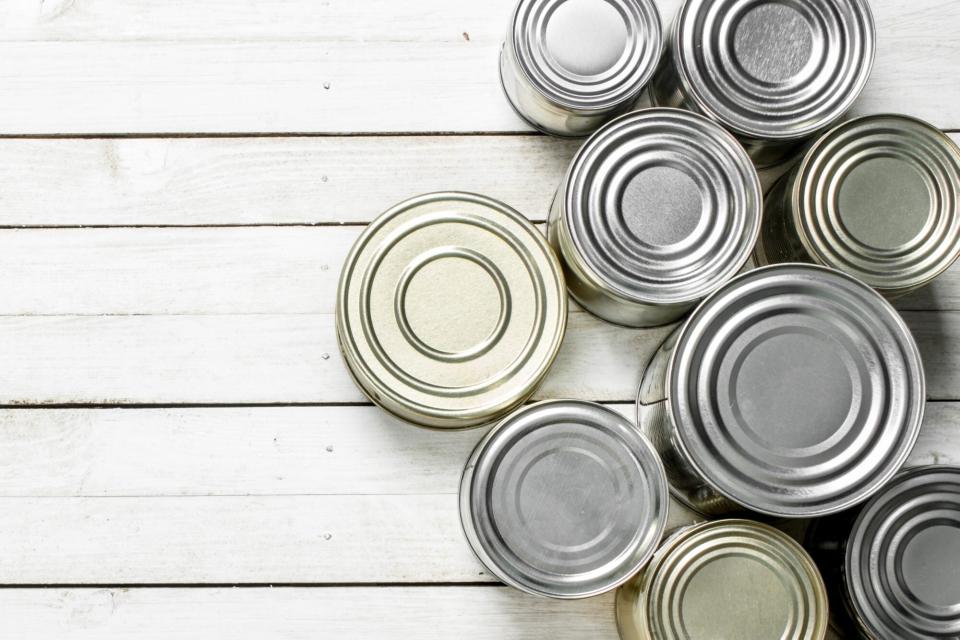How Long Does Canned Food Last?
TABLE OF CONTENTS
On This Page
"Use By" and "Sell By" Dates
How Long Canned Food Lasts
Unsafe Signs
Homemade Canned Foods
From protein-packed tuna to savory tomatoes, canned goods are an essential component of every well-stocked pantry, since they're convenient, versatile, and inexpensive. Canned foods can also be just as nutritious as their fresh and frozen counterparts, according to the Academy of Nutrition and Dietetics.
Perhaps the best characteristic of canned food is its long shelf-life, allowing you to stash away ingredients for emergencies and last-minute meals. But how long is "long," exactly? Here, food safety experts explain how long canned foods last, plus the best storage methods to prevent spoilage.

SarapulSar38 / GETTY IMAGES
What the Dates on Canned Foods Mean
When it comes to the longevity of canned food, it helps to understand what the dated labels mean (and don't mean). Otherwise, you may find yourself unnecessarily tossing cans when they're actually safe to eat. "There may be a variety of dates and numbers on store-bought canned foods, including the date the product was manufactured, the manufacturing facility information and lot code, and the 'use by' or 'sell by' date," explains Mitzi Baum, MSc, food safety instructor at Michigan State University and CEO of STOP Foodborne Illness. The "use by" and "sell by" dates typically refer to the quality, or the peak flavor and freshness of the product. "After that date, the manufacturer cannot guarantee that their product [will be] the tastiest," says Baum.
In short, the dates on canned goods indicate quality, not safety. There are other ways to determine whether canned food has spoiled and if it's safe to eat.
How Long Is Unopened Canned Food Good For?
If you have a collection of canned goods in your pantry or cupboard, you'll be glad to know that it can last indefinitely—or at least several years (yes, years!) past the date on the label, according to Bryan Quoc Le, Ph.D., food consultant and author of 150 Food Science Questions Answered. Generally, high-acid foods (like tomatoes) will maintain their quality for 18 months after the "use by" or "sell by" date, while low-acid items (like meat and vegetables) will stay at their peak for two to five years.
However, in order for this long shelf-life to hold true, the cans must be in good condition—that means free of pitted rust, bulging, swelling, leaks, and damage like dents or punctures.
The Right Way to Store Canned Food
You can ensure your canned food is in good condition by storing it properly. According to Le, canned goods should be kept in a cool, dry place, as warmth and moisture can accelerate damage and rusting. This means areas like under the sink, above the stove, and damp basements are not recommended, as noted by the U.S. Department of Agriculture. Also, canned goods shouldn't be exposed to very high or low temperatures, which can increase the risk of spoilage and ruptured cans, respectively.
When to Get Rid of Canned Food
Since the condition of a can affects the safety of its contents, looking for physical signs on the can will help you determine if it's safe to use. The USDA advises against eating food from cans that are leaking, bulging, severely dented, or pitted rusting. The same goes for canned food that has a bad odor or spurts liquid when opened.
Canned Foods and Botulism
According to Le, these deformations create microscopic holes in the can, allowing minute amounts of oxygen to enter. "This creates an environment in which botulinum spores can sporulate, leading to the growth of the bacteria Clostridium botulinum," he adds. Even with a tiny amount of oxygen, Clostridium botulinum will release the toxin that causes botulism, a rare but serious disease that affects the body's nerves.
Light rusting is not a cause for concern. "If you can wipe the rust off with a wet cloth, the food inside is still safe. If the rust is extensive and won't wipe off, throw the can away," says Baum. She points to the Packaged and Canned Food Defect Guideline by the Association of Food and Drug Officials, which provides photos to help you determine if your dented or rusted can is safe or if it should be discarded.
Home Canned Goods
If processed correctly, home canned goods can last for years, says Baum. The product's quality and nutritional value will decrease over time, but it will be safe to eat. But if the lid pops or bulges on your home-canned item, throw it away. According to Baum, this occurs when the bacteria not killed during the cooking process grows and releases gases, causing the lid to pop or expand.

